Kha17109402: Medically Assisted Euthanasia in the UK - A Report
VerifiedAdded on 2022/08/23
|6
|1791
|22
Report
AI Summary
This report, authored by Alisha Khan (Kha17109402), delves into the contentious issue of medically assisted euthanasia in the UK. The introduction provides context, defining the practice and highlighting its current illegality in the UK compared to its legality in countries like the Netherlands. The rationale underscores the controversial nature of the topic, emphasizing differing viewpoints rooted in religious beliefs and the principle of patient autonomy. The report aims to investigate the views of health and social care students on the legalization of medically assisted euthanasia in the UK, with specific objectives to define the practice, identify concerns through secondary research, conduct a student questionnaire, analyze findings, and draw conclusions. Section Two outlines the approach to secondary research, focusing on scholarly journal articles from 2010-2020, primarily from the UK, and identifies key themes such as the legal status across different countries, arguments for and against legalization, the role of religion, and the patient's right to self-determination. The report concludes by arguing that the UK should legalize assisted euthanasia, emphasizing personal choice and the upholding of patient autonomy.

Alisha khan
Kha17109402
Should medically assisted euthanasia be allowed in the UK?
Introduction
Medically Assisted euthanasia is where a physician provides the means for a pain free
death. This could be due to facing a life-time illness, terminally ill or they may be dying.
Assisted dying laws allow an individual to receive medically administered medication from a
health professional to end their life (Gerson et al., 2019). Assisted euthanasia is banned from
numerous countries including the UK. However, it is currently legal in the Netherlands,
Belgium, and Luxembourg (Inbadas et al., 2017). Some people may have religious aspects as
to why they would disagree with assisted euthanasia and this could cause confusion to
whether it should be legalised or not (Christian Ethical Boundaries of Suicide Prevention,
2018).
Rationale
The literature shows the topic of medically assisted euthanasia to be highly
controversial, as many people have different views on whether it should be legalised. Some
religious people believe that as God has given you life, then God is the only one who has the
right to take it. However some for some, the involvement of a patient in the decision making
processes relating to their health care should always be prioritized. This aligns with the
autonomy principle which focuses on allowing patients to make healthcare care decisions
according to their views and wishes (Entwistle, Carter, Cribb and McCaffery, 2010). This
tasks healthcare providers with the responsibility of ensuring that that healthcare outcomes
align with the views and needs of a patient. Medically assisted euthanasia may therefore be
perceived as a way of achieving these outcomes in end of life decision making for patients
(Frost,Sinha and Gilbert,2014).the need to understand the rationale behind these conflicting
viewpoints makes it an important research topic.
Kha17109402
Should medically assisted euthanasia be allowed in the UK?
Introduction
Medically Assisted euthanasia is where a physician provides the means for a pain free
death. This could be due to facing a life-time illness, terminally ill or they may be dying.
Assisted dying laws allow an individual to receive medically administered medication from a
health professional to end their life (Gerson et al., 2019). Assisted euthanasia is banned from
numerous countries including the UK. However, it is currently legal in the Netherlands,
Belgium, and Luxembourg (Inbadas et al., 2017). Some people may have religious aspects as
to why they would disagree with assisted euthanasia and this could cause confusion to
whether it should be legalised or not (Christian Ethical Boundaries of Suicide Prevention,
2018).
Rationale
The literature shows the topic of medically assisted euthanasia to be highly
controversial, as many people have different views on whether it should be legalised. Some
religious people believe that as God has given you life, then God is the only one who has the
right to take it. However some for some, the involvement of a patient in the decision making
processes relating to their health care should always be prioritized. This aligns with the
autonomy principle which focuses on allowing patients to make healthcare care decisions
according to their views and wishes (Entwistle, Carter, Cribb and McCaffery, 2010). This
tasks healthcare providers with the responsibility of ensuring that that healthcare outcomes
align with the views and needs of a patient. Medically assisted euthanasia may therefore be
perceived as a way of achieving these outcomes in end of life decision making for patients
(Frost,Sinha and Gilbert,2014).the need to understand the rationale behind these conflicting
viewpoints makes it an important research topic.
Paraphrase This Document
Need a fresh take? Get an instant paraphrase of this document with our AI Paraphraser
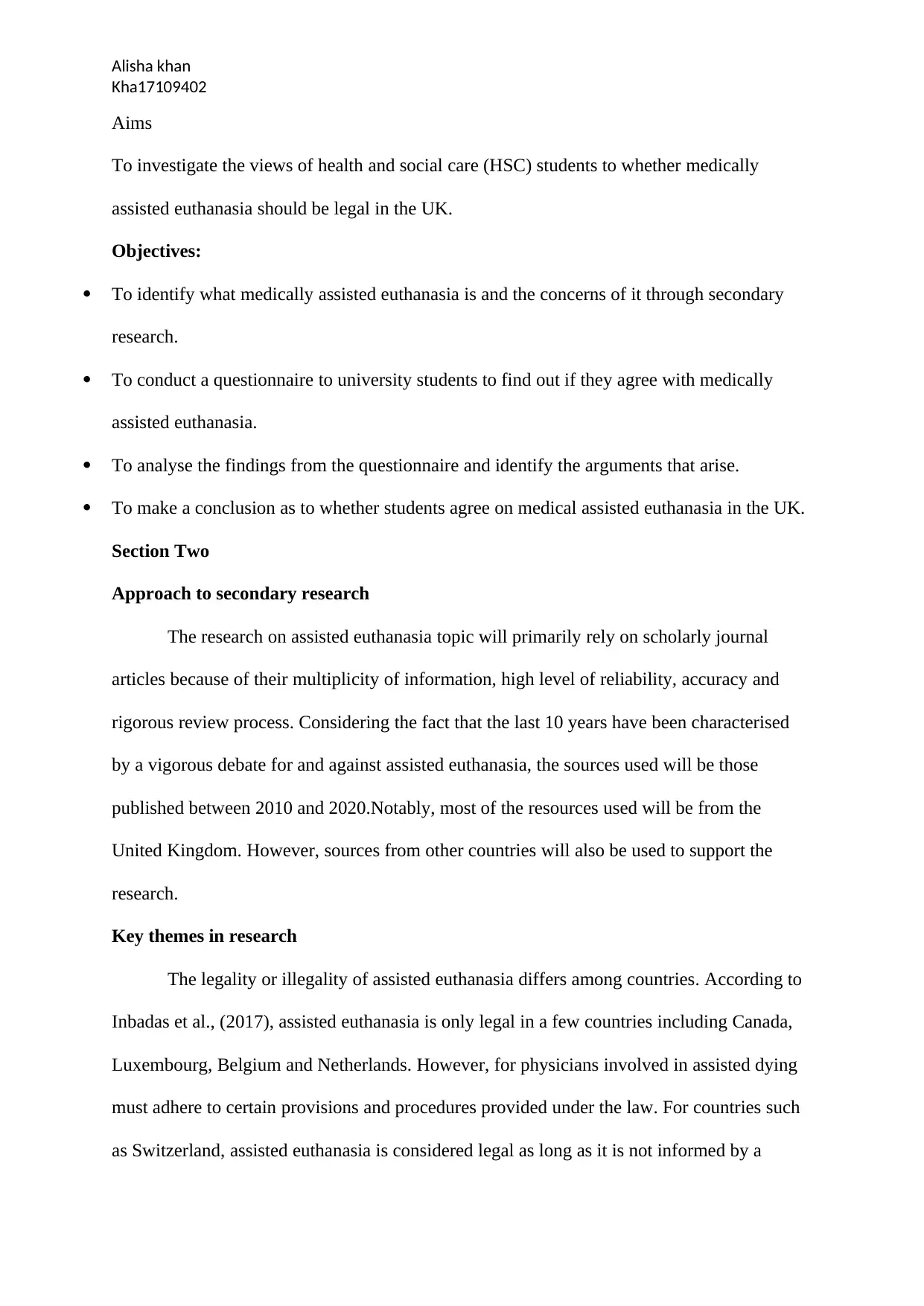
Alisha khan
Kha17109402
Aims
To investigate the views of health and social care (HSC) students to whether medically
assisted euthanasia should be legal in the UK.
Objectives:
To identify what medically assisted euthanasia is and the concerns of it through secondary
research.
To conduct a questionnaire to university students to find out if they agree with medically
assisted euthanasia.
To analyse the findings from the questionnaire and identify the arguments that arise.
To make a conclusion as to whether students agree on medical assisted euthanasia in the UK.
Section Two
Approach to secondary research
The research on assisted euthanasia topic will primarily rely on scholarly journal
articles because of their multiplicity of information, high level of reliability, accuracy and
rigorous review process. Considering the fact that the last 10 years have been characterised
by a vigorous debate for and against assisted euthanasia, the sources used will be those
published between 2010 and 2020.Notably, most of the resources used will be from the
United Kingdom. However, sources from other countries will also be used to support the
research.
Key themes in research
The legality or illegality of assisted euthanasia differs among countries. According to
Inbadas et al., (2017), assisted euthanasia is only legal in a few countries including Canada,
Luxembourg, Belgium and Netherlands. However, for physicians involved in assisted dying
must adhere to certain provisions and procedures provided under the law. For countries such
as Switzerland, assisted euthanasia is considered legal as long as it is not informed by a
Kha17109402
Aims
To investigate the views of health and social care (HSC) students to whether medically
assisted euthanasia should be legal in the UK.
Objectives:
To identify what medically assisted euthanasia is and the concerns of it through secondary
research.
To conduct a questionnaire to university students to find out if they agree with medically
assisted euthanasia.
To analyse the findings from the questionnaire and identify the arguments that arise.
To make a conclusion as to whether students agree on medical assisted euthanasia in the UK.
Section Two
Approach to secondary research
The research on assisted euthanasia topic will primarily rely on scholarly journal
articles because of their multiplicity of information, high level of reliability, accuracy and
rigorous review process. Considering the fact that the last 10 years have been characterised
by a vigorous debate for and against assisted euthanasia, the sources used will be those
published between 2010 and 2020.Notably, most of the resources used will be from the
United Kingdom. However, sources from other countries will also be used to support the
research.
Key themes in research
The legality or illegality of assisted euthanasia differs among countries. According to
Inbadas et al., (2017), assisted euthanasia is only legal in a few countries including Canada,
Luxembourg, Belgium and Netherlands. However, for physicians involved in assisted dying
must adhere to certain provisions and procedures provided under the law. For countries such
as Switzerland, assisted euthanasia is considered legal as long as it is not informed by a
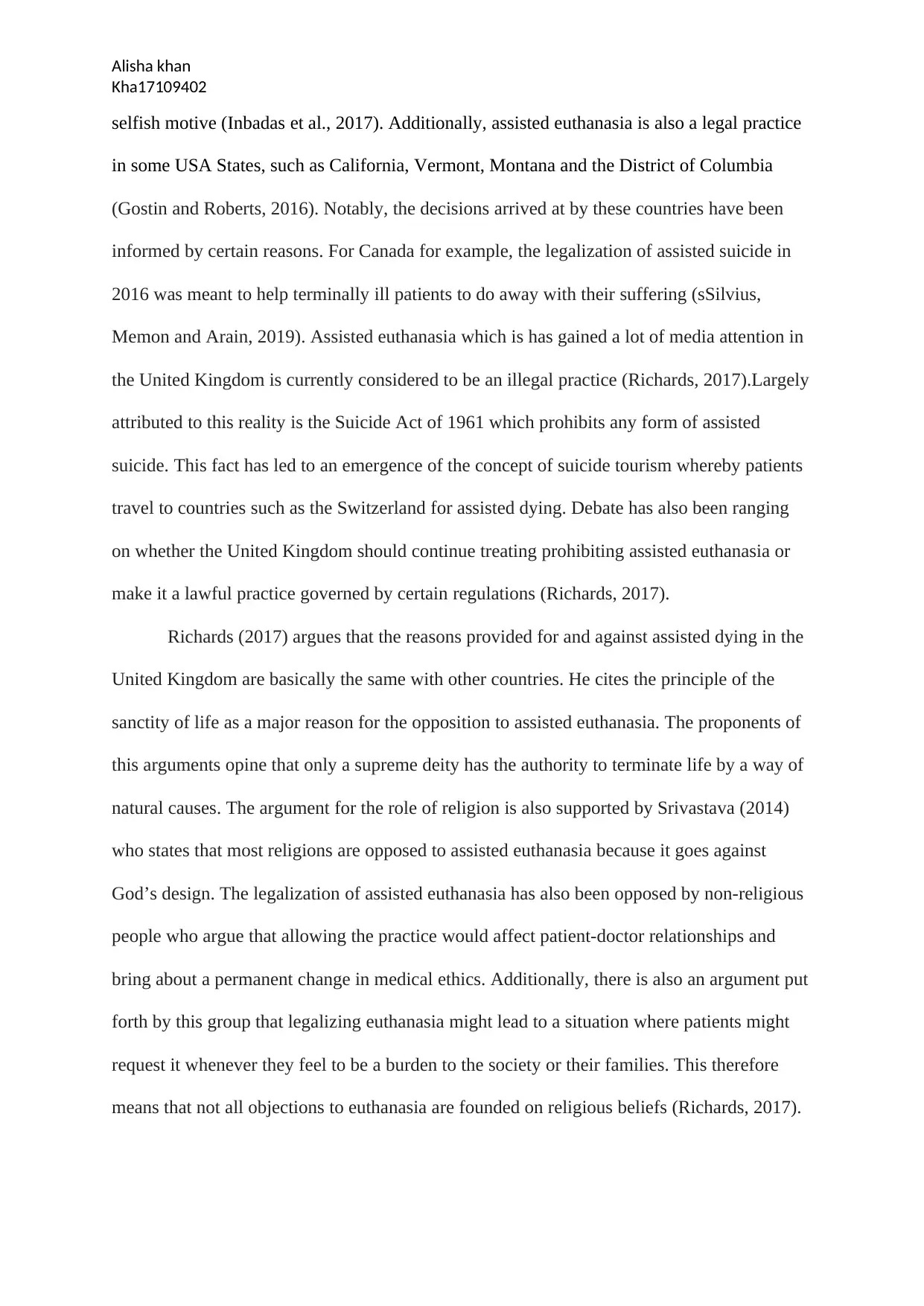
Alisha khan
Kha17109402
selfish motive (Inbadas et al., 2017). Additionally, assisted euthanasia is also a legal practice
in some USA States, such as California, Vermont, Montana and the District of Columbia
(Gostin and Roberts, 2016). Notably, the decisions arrived at by these countries have been
informed by certain reasons. For Canada for example, the legalization of assisted suicide in
2016 was meant to help terminally ill patients to do away with their suffering (sSilvius,
Memon and Arain, 2019). Assisted euthanasia which is has gained a lot of media attention in
the United Kingdom is currently considered to be an illegal practice (Richards, 2017).Largely
attributed to this reality is the Suicide Act of 1961 which prohibits any form of assisted
suicide. This fact has led to an emergence of the concept of suicide tourism whereby patients
travel to countries such as the Switzerland for assisted dying. Debate has also been ranging
on whether the United Kingdom should continue treating prohibiting assisted euthanasia or
make it a lawful practice governed by certain regulations (Richards, 2017).
Richards (2017) argues that the reasons provided for and against assisted dying in the
United Kingdom are basically the same with other countries. He cites the principle of the
sanctity of life as a major reason for the opposition to assisted euthanasia. The proponents of
this arguments opine that only a supreme deity has the authority to terminate life by a way of
natural causes. The argument for the role of religion is also supported by Srivastava (2014)
who states that most religions are opposed to assisted euthanasia because it goes against
God’s design. The legalization of assisted euthanasia has also been opposed by non-religious
people who argue that allowing the practice would affect patient-doctor relationships and
bring about a permanent change in medical ethics. Additionally, there is also an argument put
forth by this group that legalizing euthanasia might lead to a situation where patients might
request it whenever they feel to be a burden to the society or their families. This therefore
means that not all objections to euthanasia are founded on religious beliefs (Richards, 2017).
Kha17109402
selfish motive (Inbadas et al., 2017). Additionally, assisted euthanasia is also a legal practice
in some USA States, such as California, Vermont, Montana and the District of Columbia
(Gostin and Roberts, 2016). Notably, the decisions arrived at by these countries have been
informed by certain reasons. For Canada for example, the legalization of assisted suicide in
2016 was meant to help terminally ill patients to do away with their suffering (sSilvius,
Memon and Arain, 2019). Assisted euthanasia which is has gained a lot of media attention in
the United Kingdom is currently considered to be an illegal practice (Richards, 2017).Largely
attributed to this reality is the Suicide Act of 1961 which prohibits any form of assisted
suicide. This fact has led to an emergence of the concept of suicide tourism whereby patients
travel to countries such as the Switzerland for assisted dying. Debate has also been ranging
on whether the United Kingdom should continue treating prohibiting assisted euthanasia or
make it a lawful practice governed by certain regulations (Richards, 2017).
Richards (2017) argues that the reasons provided for and against assisted dying in the
United Kingdom are basically the same with other countries. He cites the principle of the
sanctity of life as a major reason for the opposition to assisted euthanasia. The proponents of
this arguments opine that only a supreme deity has the authority to terminate life by a way of
natural causes. The argument for the role of religion is also supported by Srivastava (2014)
who states that most religions are opposed to assisted euthanasia because it goes against
God’s design. The legalization of assisted euthanasia has also been opposed by non-religious
people who argue that allowing the practice would affect patient-doctor relationships and
bring about a permanent change in medical ethics. Additionally, there is also an argument put
forth by this group that legalizing euthanasia might lead to a situation where patients might
request it whenever they feel to be a burden to the society or their families. This therefore
means that not all objections to euthanasia are founded on religious beliefs (Richards, 2017).
⊘ This is a preview!⊘
Do you want full access?
Subscribe today to unlock all pages.

Trusted by 1+ million students worldwide
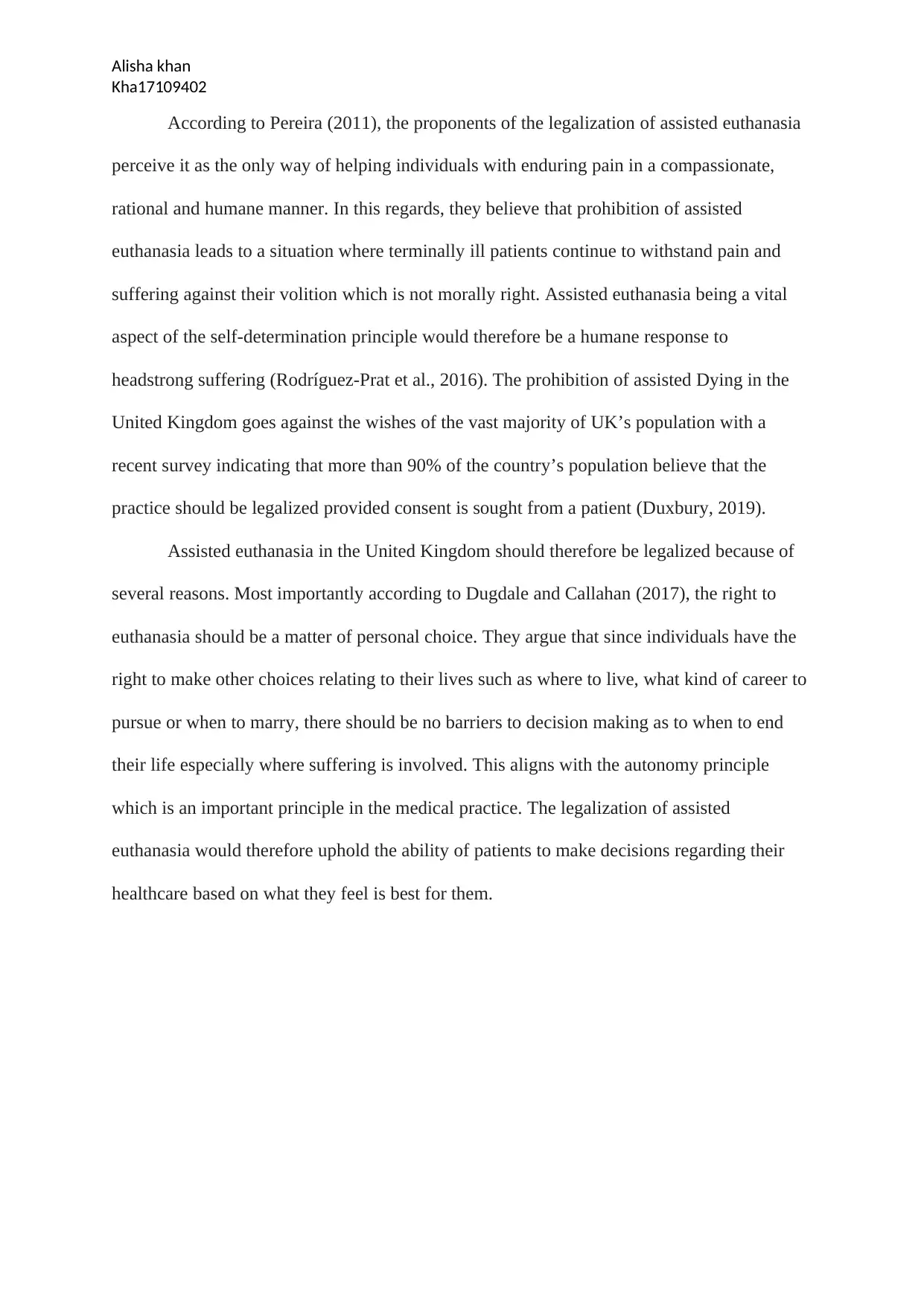
Alisha khan
Kha17109402
According to Pereira (2011), the proponents of the legalization of assisted euthanasia
perceive it as the only way of helping individuals with enduring pain in a compassionate,
rational and humane manner. In this regards, they believe that prohibition of assisted
euthanasia leads to a situation where terminally ill patients continue to withstand pain and
suffering against their volition which is not morally right. Assisted euthanasia being a vital
aspect of the self-determination principle would therefore be a humane response to
headstrong suffering (Rodríguez-Prat et al., 2016). The prohibition of assisted Dying in the
United Kingdom goes against the wishes of the vast majority of UK’s population with a
recent survey indicating that more than 90% of the country’s population believe that the
practice should be legalized provided consent is sought from a patient (Duxbury, 2019).
Assisted euthanasia in the United Kingdom should therefore be legalized because of
several reasons. Most importantly according to Dugdale and Callahan (2017), the right to
euthanasia should be a matter of personal choice. They argue that since individuals have the
right to make other choices relating to their lives such as where to live, what kind of career to
pursue or when to marry, there should be no barriers to decision making as to when to end
their life especially where suffering is involved. This aligns with the autonomy principle
which is an important principle in the medical practice. The legalization of assisted
euthanasia would therefore uphold the ability of patients to make decisions regarding their
healthcare based on what they feel is best for them.
Kha17109402
According to Pereira (2011), the proponents of the legalization of assisted euthanasia
perceive it as the only way of helping individuals with enduring pain in a compassionate,
rational and humane manner. In this regards, they believe that prohibition of assisted
euthanasia leads to a situation where terminally ill patients continue to withstand pain and
suffering against their volition which is not morally right. Assisted euthanasia being a vital
aspect of the self-determination principle would therefore be a humane response to
headstrong suffering (Rodríguez-Prat et al., 2016). The prohibition of assisted Dying in the
United Kingdom goes against the wishes of the vast majority of UK’s population with a
recent survey indicating that more than 90% of the country’s population believe that the
practice should be legalized provided consent is sought from a patient (Duxbury, 2019).
Assisted euthanasia in the United Kingdom should therefore be legalized because of
several reasons. Most importantly according to Dugdale and Callahan (2017), the right to
euthanasia should be a matter of personal choice. They argue that since individuals have the
right to make other choices relating to their lives such as where to live, what kind of career to
pursue or when to marry, there should be no barriers to decision making as to when to end
their life especially where suffering is involved. This aligns with the autonomy principle
which is an important principle in the medical practice. The legalization of assisted
euthanasia would therefore uphold the ability of patients to make decisions regarding their
healthcare based on what they feel is best for them.
Paraphrase This Document
Need a fresh take? Get an instant paraphrase of this document with our AI Paraphraser
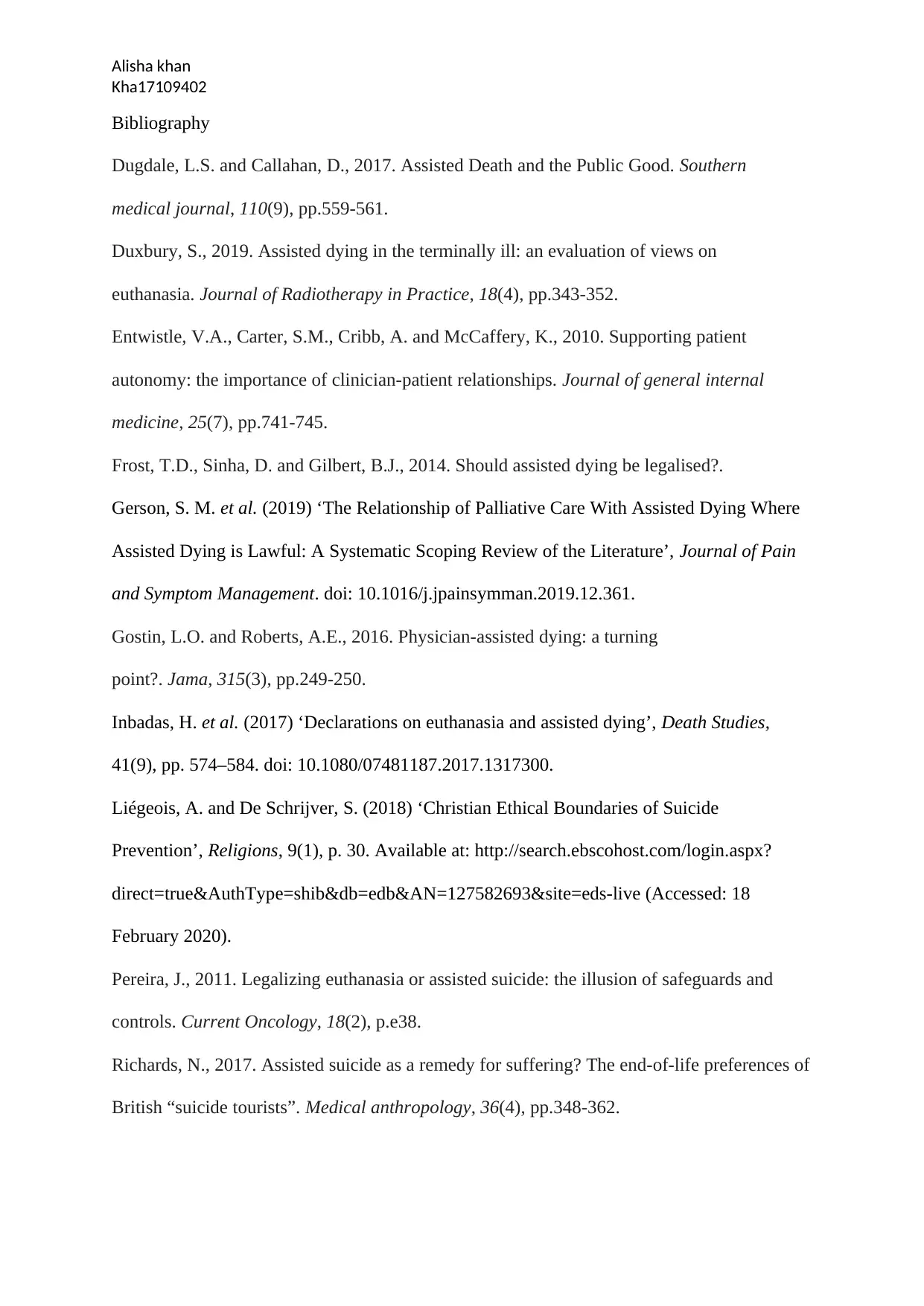
Alisha khan
Kha17109402
Bibliography
Dugdale, L.S. and Callahan, D., 2017. Assisted Death and the Public Good. Southern
medical journal, 110(9), pp.559-561.
Duxbury, S., 2019. Assisted dying in the terminally ill: an evaluation of views on
euthanasia. Journal of Radiotherapy in Practice, 18(4), pp.343-352.
Entwistle, V.A., Carter, S.M., Cribb, A. and McCaffery, K., 2010. Supporting patient
autonomy: the importance of clinician-patient relationships. Journal of general internal
medicine, 25(7), pp.741-745.
Frost, T.D., Sinha, D. and Gilbert, B.J., 2014. Should assisted dying be legalised?.
Gerson, S. M. et al. (2019) ‘The Relationship of Palliative Care With Assisted Dying Where
Assisted Dying is Lawful: A Systematic Scoping Review of the Literature’, Journal of Pain
and Symptom Management. doi: 10.1016/j.jpainsymman.2019.12.361.
Gostin, L.O. and Roberts, A.E., 2016. Physician-assisted dying: a turning
point?. Jama, 315(3), pp.249-250.
Inbadas, H. et al. (2017) ‘Declarations on euthanasia and assisted dying’, Death Studies,
41(9), pp. 574–584. doi: 10.1080/07481187.2017.1317300.
Liégeois, A. and De Schrijver, S. (2018) ‘Christian Ethical Boundaries of Suicide
Prevention’, Religions, 9(1), p. 30. Available at: http://search.ebscohost.com/login.aspx?
direct=true&AuthType=shib&db=edb&AN=127582693&site=eds-live (Accessed: 18
February 2020).
Pereira, J., 2011. Legalizing euthanasia or assisted suicide: the illusion of safeguards and
controls. Current Oncology, 18(2), p.e38.
Richards, N., 2017. Assisted suicide as a remedy for suffering? The end-of-life preferences of
British “suicide tourists”. Medical anthropology, 36(4), pp.348-362.
Kha17109402
Bibliography
Dugdale, L.S. and Callahan, D., 2017. Assisted Death and the Public Good. Southern
medical journal, 110(9), pp.559-561.
Duxbury, S., 2019. Assisted dying in the terminally ill: an evaluation of views on
euthanasia. Journal of Radiotherapy in Practice, 18(4), pp.343-352.
Entwistle, V.A., Carter, S.M., Cribb, A. and McCaffery, K., 2010. Supporting patient
autonomy: the importance of clinician-patient relationships. Journal of general internal
medicine, 25(7), pp.741-745.
Frost, T.D., Sinha, D. and Gilbert, B.J., 2014. Should assisted dying be legalised?.
Gerson, S. M. et al. (2019) ‘The Relationship of Palliative Care With Assisted Dying Where
Assisted Dying is Lawful: A Systematic Scoping Review of the Literature’, Journal of Pain
and Symptom Management. doi: 10.1016/j.jpainsymman.2019.12.361.
Gostin, L.O. and Roberts, A.E., 2016. Physician-assisted dying: a turning
point?. Jama, 315(3), pp.249-250.
Inbadas, H. et al. (2017) ‘Declarations on euthanasia and assisted dying’, Death Studies,
41(9), pp. 574–584. doi: 10.1080/07481187.2017.1317300.
Liégeois, A. and De Schrijver, S. (2018) ‘Christian Ethical Boundaries of Suicide
Prevention’, Religions, 9(1), p. 30. Available at: http://search.ebscohost.com/login.aspx?
direct=true&AuthType=shib&db=edb&AN=127582693&site=eds-live (Accessed: 18
February 2020).
Pereira, J., 2011. Legalizing euthanasia or assisted suicide: the illusion of safeguards and
controls. Current Oncology, 18(2), p.e38.
Richards, N., 2017. Assisted suicide as a remedy for suffering? The end-of-life preferences of
British “suicide tourists”. Medical anthropology, 36(4), pp.348-362.
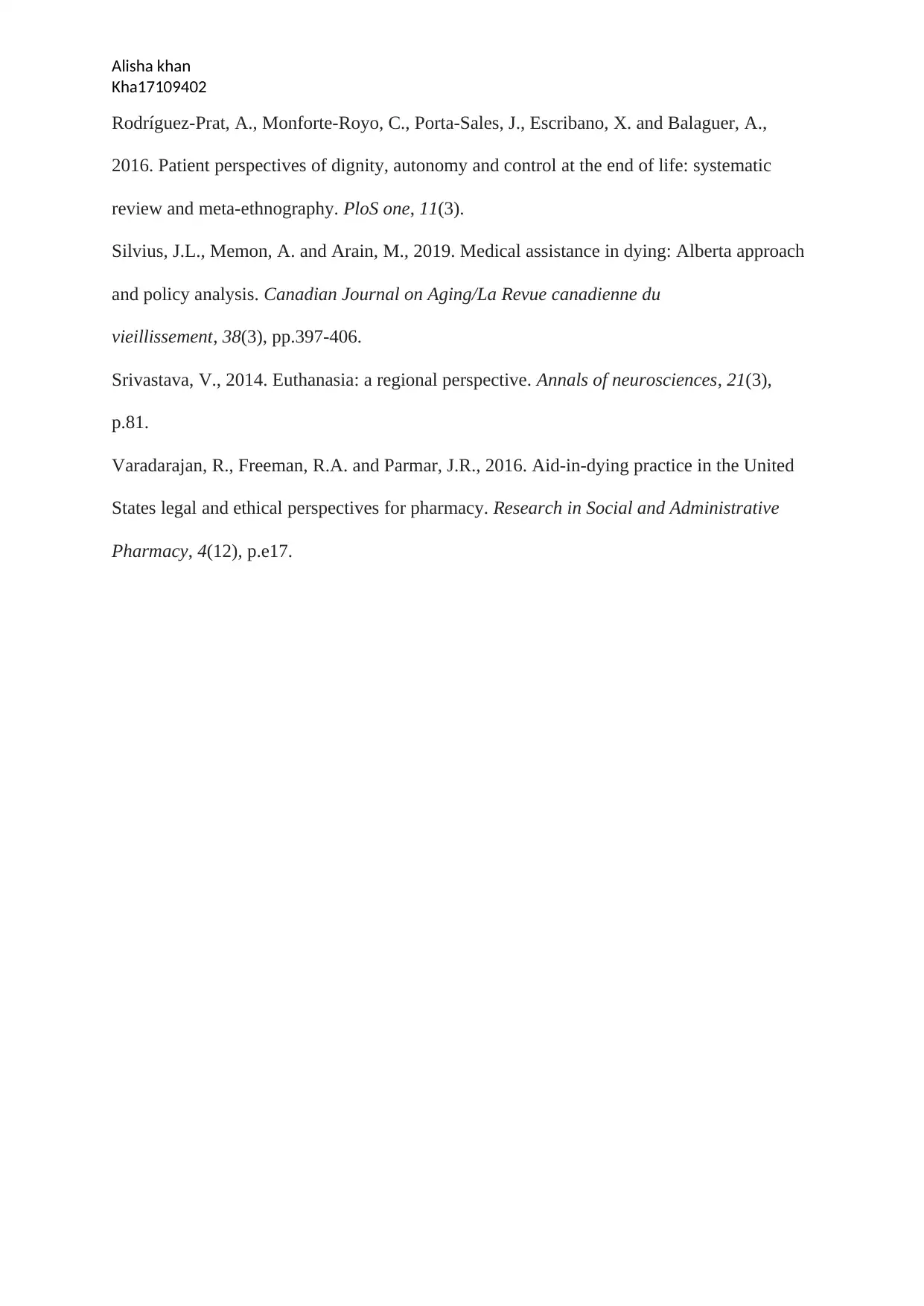
Alisha khan
Kha17109402
Rodríguez-Prat, A., Monforte-Royo, C., Porta-Sales, J., Escribano, X. and Balaguer, A.,
2016. Patient perspectives of dignity, autonomy and control at the end of life: systematic
review and meta-ethnography. PloS one, 11(3).
Silvius, J.L., Memon, A. and Arain, M., 2019. Medical assistance in dying: Alberta approach
and policy analysis. Canadian Journal on Aging/La Revue canadienne du
vieillissement, 38(3), pp.397-406.
Srivastava, V., 2014. Euthanasia: a regional perspective. Annals of neurosciences, 21(3),
p.81.
Varadarajan, R., Freeman, R.A. and Parmar, J.R., 2016. Aid-in-dying practice in the United
States legal and ethical perspectives for pharmacy. Research in Social and Administrative
Pharmacy, 4(12), p.e17.
Kha17109402
Rodríguez-Prat, A., Monforte-Royo, C., Porta-Sales, J., Escribano, X. and Balaguer, A.,
2016. Patient perspectives of dignity, autonomy and control at the end of life: systematic
review and meta-ethnography. PloS one, 11(3).
Silvius, J.L., Memon, A. and Arain, M., 2019. Medical assistance in dying: Alberta approach
and policy analysis. Canadian Journal on Aging/La Revue canadienne du
vieillissement, 38(3), pp.397-406.
Srivastava, V., 2014. Euthanasia: a regional perspective. Annals of neurosciences, 21(3),
p.81.
Varadarajan, R., Freeman, R.A. and Parmar, J.R., 2016. Aid-in-dying practice in the United
States legal and ethical perspectives for pharmacy. Research in Social and Administrative
Pharmacy, 4(12), p.e17.
⊘ This is a preview!⊘
Do you want full access?
Subscribe today to unlock all pages.

Trusted by 1+ million students worldwide
1 out of 6
Related Documents
Your All-in-One AI-Powered Toolkit for Academic Success.
+13062052269
info@desklib.com
Available 24*7 on WhatsApp / Email
![[object Object]](/_next/static/media/star-bottom.7253800d.svg)
Unlock your academic potential
Copyright © 2020–2026 A2Z Services. All Rights Reserved. Developed and managed by ZUCOL.





